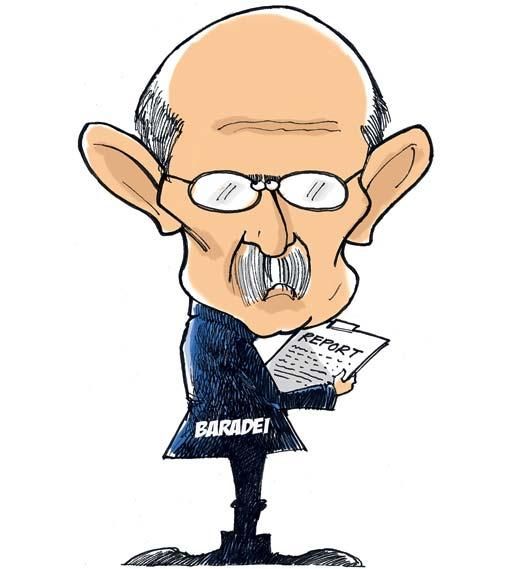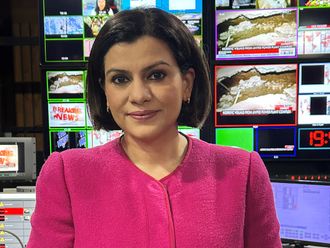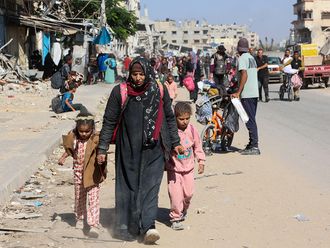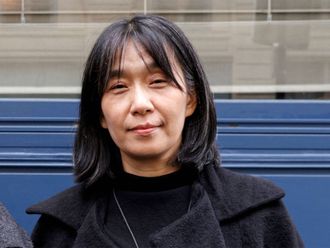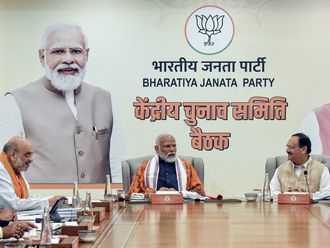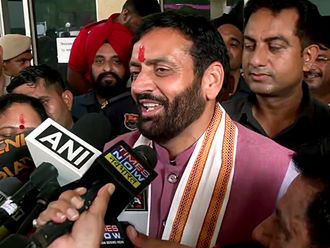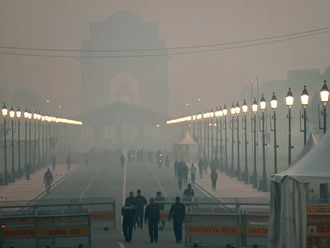Mohammad Al Baradei has never been known for his penmanship. However, in a day or two, when the Egyptian director of the International Atomic Energy Agency (IAEA) publishes his latest report on Iran's controversial nuclear programme, he may be making the difference between war and peace.
The report would have to answer one key question: Has Iran complied with the terms of two resolutions passed by the United Nations' Security Council?
If Al Baradei's answer is in the affirmative, the Security Council could pass a new resolution, confirming Iran's compliance and initiating new negotiations to build on what would be a positive development.
If, on the other hand, Al Baradei reports that Iran is still defying the two resolutions, the Security Council, having fixed a two-month ultimatum, would have to consider tougher measures, including possible military action.
The common assumption in Western political circles is that the Bush administration in Washington, now in its lame-duck phase, would like nothing better than a legal cover for military action against Iran.
If that analysis were correct, the Bush administration would quietly welcome Al Baradei's report that clearly states Iran to be in defiance of the UN resolutions.
That consideration might persuade Al Baradei to opt for a fishtail narrative that would avoid a yes or no answer to the key question concerning Iran's programme.
Al Baradei is not as concerned about Iran building a nuclear arsenal as American and European leaders who would have to deal with a dangerous adversary that could use the ultimate weapon against them.
Al Baradei arrives at this conclusion in a twisted way. He assumes that if Iran were to do big mischief, the Americans would deal with it regardless of what IAEA says.
In that case, there is no reason for the IAEA director to anger the Islamic Republic and risk being targeted by "martyrdom-loving" fanatics simply because he exposes the mullahs' mendacity.
If, on the other hand, the Islamic Republic does no big mischief, Al Baradaei could always spend his retirement on the lecture circuit bragging about his success in preventing another war in the Middle East.
As always, however, that paradox hides another.
By refusing to expose Iran's violation of the UN resolutions, Al Baradei would encourage Iranian President Mahmoud Ahmadinejad in his delusion that Tehran has won and thus need offer no concessions on the nuclear issue.
Ahmadinejad hammered in the point in his talks with the Russian Foreign Minister Sergey Lavrov during the latter's visit to Tehran last week.
Lavrov had gone to the Iranian capital to obtain an answer to the compromise formula that Russian President Vladimir Putin had put to the Iran's "Supreme Guide" Ali Khamenei last month. The Iranians had not shown the minimum courtesy of at least discussing the Putin formula in a serious way.
And, when Lavrov told the mullahs that they had to do something fast to avoid new UN sanctions, they came back with the claim that Iran expects a "good report" from Al Baradei.
The nuclear dispute has been transformed into a key issue of Iran's domestic politics.
Iran's President Mahmoud Ahmadinejad claims that his rivals, including two of his predecessors as president, Hashemi Rafsanjani and Mohammad Khatami, actually "betrayed the revolution" by agreeing to scale down Iran's nuclear programme and suspend uranium enrichment.
"The more concessions we give to the 'Great Satan', the hungrier it becomes for more," Ahmadinejad said in a speech at the Science and Industry University in Tehran last Sunday. "Those who press us to climb down [on the nuclear issue] are traitors whom we shall expose."
Admission of guilt
Ahmadinejad further insists that offering any concession would, in itself, amount to an admission of guilt.
Ahmadinejad's argument resonates well with the radical base of the regime. He says that the Islamic Republic wants to join the club of the seven nations currently capable of enriching uranium.
What Ahmadinejad does not say but implies is even more important. He claims that Iran should consider offering concessions only if, and when, it has no other choice. For the time being, however, he thinks that the Islamic Republic has won by confusing the issue, dividing the big powers, and engaging the IAEA in a cynical tango.
"Why should we offer preemptive surrender when the threat of preemptive war against us is nonexistent?" demands Hassan Abbasi, the president's strategic guru.
And this brings us back to Al Baradei and his report.
Back in 2002, Al Baradei's fishtail reports on Iraq's nuclear programme encouraged Saddam Hussain in his defiance of 18 UN resolutions.
Had Al Baradei, and his overall boss at the time Hans Blix, come out with a clear statement that Iraq did not possess any Weapons of Mass Destructions (WMDs), they might have made it impossible for the US-led coalition to invade Iraq.
On the other hand, had they reported that Saddam should take specific measures to prove that he had dismantled his arsenal of WMDs, and the political and economic structures that could rebuild them at short notice, they might have persuaded the despot to take the threat of war seriously and transfer power to a caretaker administration in Baghdad. In either case, a clear position from the inspectors might have prevented war.
Worst option
Al Baradei and Blix, however, chose the worst option: they equivocated, thus encouraging Saddam in his defiance while leaving the US and its allies no option but war to enforce the UN resolutions. Al Baradei should not repeat the same mistake over Iran.
His report should debunk Ahmadinejad's claims by stating unequivocally that the Islamic Republic has already violated the terms of the Nuclear Non-proliferation Treaty on 32 issues over more than 18 years.
Al Baradei should also expose Ahmadinejad's bogus claim that Iran is enriching uranium as fuel for power stations. Iran has no nuclear power plants and thus has no need of enriched uranium.
The only nuclear power plant under construction in Iran is to be completed by Russians at an unspecified date. But the uranium enriched by Iran at Natanz is not suitable for the plant being built by the Russians because it needs a different-type of fuel designated by an exclusive scientific code - a code that Moscow has refused to communicate to Tehran.
Because nuclear fuel has a lifespan of three to four years, the Natanz uranium cannot be intended for any of the 22 nuclear power plants that Ahmadinejad says he wants to build in Iran over the next 25 years. (None of those is even in the drawing stage.)
If the centrifuges are working to train Iranian scientists, Al Baradei should know that, at the level of scientific research, Iran was already able to enrich uranium in 1978.
The centrifuges working at Natanz can only be producing ingredients for nuclear warheads. Al Baradei should tell that truth to the Iranian people and the world at large.
Amir Taheri is an Iranian writer based in Europe.


